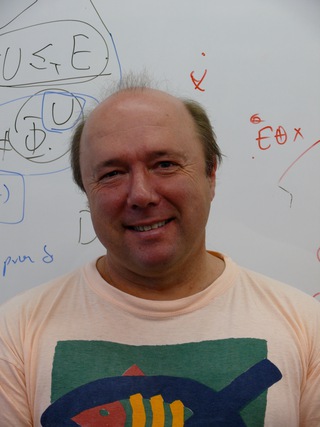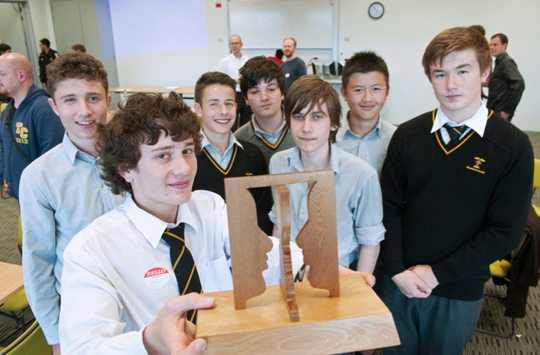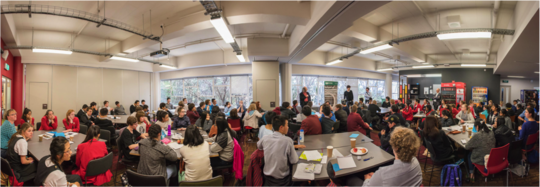News Archive
When does a problem have a solution?
21 Apr 2009 - 13:32 in Event
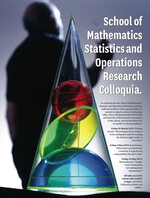 Hot on the heels of the first of the MSOR School Colloquium Talks - Richard Arnold 's talk on earthquakes and his election night forecasting, which attracted a large audience - comes the second colloquium talk, this time by Rod Downey. Rod's talk, "When does a problem have a solution: A logician and computability theorist's view", is aimed at a very general audience, and will be accessible to beginning graduate or even advanced undergraduate students.
The talk will be given in the Cotton Club (CO339) at 4pm on Friday May 8th, with refreshments to follow. For more information about the MSOR Research Colloquia, visit http://msor.victoria.ac.nz/Main/MSORColloquia, or click on the link on the left side of this page. A short description of Rod's talk is given below:
Much of mathematics is devoted to giving solutions to equations, calculating solutions to problems, classifying structures according to invariants and the like. Natural questions arise as to when this is not possible. This talk looks at questions such as this tracing, in a idiosyncratic way, a historical line leading to modern incarnations wherein logic allows us to show that no invariants are possible for (e.g.) certain problems in group theory. This is done by showing that normal mathematical structures can be caused to emulate computation in faithful ways.
Hot on the heels of the first of the MSOR School Colloquium Talks - Richard Arnold 's talk on earthquakes and his election night forecasting, which attracted a large audience - comes the second colloquium talk, this time by Rod Downey. Rod's talk, "When does a problem have a solution: A logician and computability theorist's view", is aimed at a very general audience, and will be accessible to beginning graduate or even advanced undergraduate students.
The talk will be given in the Cotton Club (CO339) at 4pm on Friday May 8th, with refreshments to follow. For more information about the MSOR Research Colloquia, visit http://msor.victoria.ac.nz/Main/MSORColloquia, or click on the link on the left side of this page. A short description of Rod's talk is given below:
Much of mathematics is devoted to giving solutions to equations, calculating solutions to problems, classifying structures according to invariants and the like. Natural questions arise as to when this is not possible. This talk looks at questions such as this tracing, in a idiosyncratic way, a historical line leading to modern incarnations wherein logic allows us to show that no invariants are possible for (e.g.) certain problems in group theory. This is done by showing that normal mathematical structures can be caused to emulate computation in faithful ways.
Upcoming MSOR Colloquium
25 Jun 2009 - 11:14 in Event
At 4pm Friday 17 July 2009, in CO339, Dillon Mayhew will present the next MSOR Colloqium: "What is a Matroid?"
Abstract: Matroids are abstract objects that lie just beneath the surface of many naturally-occurring mathematical entities. In this talk I will explain what matroids are, why you should be interested in them, and more particularly, why I am interested in them. The talk will be introductory, and no prior knowledge will be assumed.
Summer Research Scholarships 2014/2015
29 Sep 2014 - 09:40 in Event
Summer Research Scholarships are on offer across the Faculty of Science, including through the Antarctic Research Centre, Robinson Research Institute and Ferrier Research Institute. Some are externally funded and will involve students working with external organisations around Wellington. Applications for the 2014/2015 round are now open, and are due on the 1st of October. For more information please click here
Second MSOR Colloquium Talk this Friday
05 May 2009 - 14:09 in Event
 Hot on the heels of the first of the MSOR School Colloquium Talks - Richard Arnold 's talk on earthquakes and his election night forecasting, which attracted a large audience - comes the second colloquium talk, this time by Rod Downey. Rod's talk, "When does a problem have a solution: A logician and computability theorist's view", is aimed at a very general audience, and will be accessible to beginning graduate or even advanced undergraduate students.
The talk will be given in the Cotton Club (CO339) at 4pm on Friday May 8th, with refreshments to follow. For more information about the MSOR Research Colloquia, visit http://msor.victoria.ac.nz/Main/MSORColloquia, or click on the link on the left side of this page. A short description of Rod's talk is given below:
Much of mathematics is devoted to giving solutions to equations, calculating solutions to problems, classifying structures according to invariants and the like. Natural questions arise as to when this is not possible. This talk looks at questions such as this tracing, in a idiosyncratic way, a historical line leading to modern incarnations wherein logic allows us to show that no invariants are possible for (e.g.) certain problems in group theory. This is done by showing that normal mathematical structures can be caused to emulate computation in faithful ways.
This news item is a repeat of an earlier reminder about Rod's talk.
Hot on the heels of the first of the MSOR School Colloquium Talks - Richard Arnold 's talk on earthquakes and his election night forecasting, which attracted a large audience - comes the second colloquium talk, this time by Rod Downey. Rod's talk, "When does a problem have a solution: A logician and computability theorist's view", is aimed at a very general audience, and will be accessible to beginning graduate or even advanced undergraduate students.
The talk will be given in the Cotton Club (CO339) at 4pm on Friday May 8th, with refreshments to follow. For more information about the MSOR Research Colloquia, visit http://msor.victoria.ac.nz/Main/MSORColloquia, or click on the link on the left side of this page. A short description of Rod's talk is given below:
Much of mathematics is devoted to giving solutions to equations, calculating solutions to problems, classifying structures according to invariants and the like. Natural questions arise as to when this is not possible. This talk looks at questions such as this tracing, in a idiosyncratic way, a historical line leading to modern incarnations wherein logic allows us to show that no invariants are possible for (e.g.) certain problems in group theory. This is done by showing that normal mathematical structures can be caused to emulate computation in faithful ways.
This news item is a repeat of an earlier reminder about Rod's talk.
Rod Downey at Royal Society Science Forum
05 May 2009 - 15:40 in Event
Professor Rod Downey was invited to take part in the Royal Society's Speakers Science Forum on Tuesday 5 May 2009 at Parliament Buildings..
Every year, the Royal Society of New Zealand runs a series of short science talks for Members of Parliament, under the auspices of the Speaker of Parliament. The series runs from March to June on selected Tuesday nights. It is timed to fit within MP's dinner hour. Each session concludes with a light buffet dinner before MPs go back into session.
Rod Downey on Alan Turing
12 Mar 2015 - 11:37 in Event
Rod Downey, one of the world’s leading experts on the theory of computation and a Professor in the School of Mathematics, Statistics and Operations Research, has been talking about the work of computing pioneer and Bletchley Park code-breaker extraordinaire Alan Turing.
An interview with Rod on Alan Turing’s life, work and influence, as well as his portrayal in the recent movie 'The Imitation game’, is to be aired on Our Changing World at 9pm on Thursday 12 March. A longer audio version of the talk is available at: http://www.radionz.co.nz/national/programmes/ourchangingworld
In February, Rod also gave a public lecture 'Alan Turing, Computing, Bletchley and Mathematics’. A recording of the talk is available here
Slides accompanying the lecture are also available at http://homepages.ecs.vuw.ac.nz/~downey/turing_15.pdf
Prof Shirley Pledger's Inaugural Lecture
13 Jun 2011 - 10:49 in Event
Keeping count of our species
Just how bad is the plight of native frogs? How are kakapo or tuatara doing?
A Victoria University professor has used statistical techniques to estimate numbers in animal populations, providing accurate data that are essential to conservation efforts.
Professor Shirley Pledger, an international expert in this area, will explore how statistics has helped conservation in her inaugural professorial lecture at Victoria University next Tuesday.
Her research has built on the 'capture-recapture' method used by scientists.
"Capture-recapture is a technique that provides accurate estimates of animals, including any that remain hidden," says Professor Pledger. "It gives us data so we know what we're dealing with. For instance, do we need to concentrate more on removing predators? Where are numbers strong?"
Using the technique, scientists capture a sample of animals, mark them then release them. Later they capture another sample and use the proportion of marked animals that are recaptured to estimate the total animal population.
Professor Pledger's research has focused on improving the capture-recapture method, trying different models to accurately estimate the numbers of animals.
"Some animals are bold, some shy, some move around. Scientists either surveyed 'closed' populations, which is a kind of snapshot, or 'open' populations over a length of time that saw births, deaths and migrations. The outstanding problem for 20 years or so was that most surveys typically underestimated population sizes - now that's much less of an issue."
As well as working with biologists at Victoria and other institutions in New Zealand, Professor Pledger has strong international connections.
Her statistical work forms part of a US computer package for surveying animal populations.
Vice-Chancellor Professor Pat Walsh says Victoria's inaugural lecture series is an opportunity for professors to provide family, friends, colleagues and the wider community with an insight into their specialist area of study.
"It is also an opportunity for the University to celebrate and acknowledge our valued professors," says Professor Walsh.
Inaugural lecture - Professor Shirley Pledger
'How many animals are in the area? When counting doesn't work'
Tuesday 21 June, 6pm
Hunter Council Chamber, Level 2, Hunter Building
Victoria University, Kelburn RSVPs essential - please email rsvp@vuw.ac.nz with 'Pledger' in the subject line or call 04 463 5810 For more information, please contact Professor Shirley Pledger on 04 463 6788 or email shirley.pledger@vuw.ac.nz
Invitation (click image below for a pdf)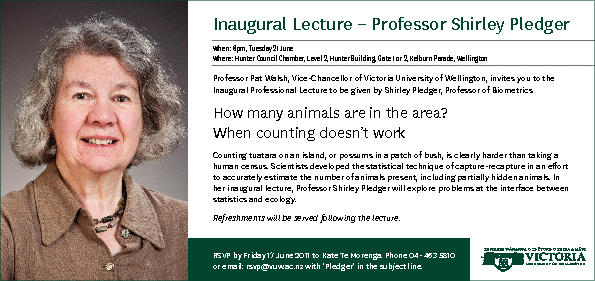
Inaugural lecture - Professor Shirley Pledger
'How many animals are in the area? When counting doesn't work'
Tuesday 21 June, 6pm
Hunter Council Chamber, Level 2, Hunter Building
Victoria University, Kelburn RSVPs essential - please email rsvp@vuw.ac.nz with 'Pledger' in the subject line or call 04 463 5810 For more information, please contact Professor Shirley Pledger on 04 463 6788 or email shirley.pledger@vuw.ac.nz
Invitation (click image below for a pdf)

Popular math writer to speak in Wellington
19 Sep 2013 - 12:42 in Event
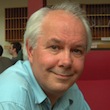 The author of numerous books which have popularised mathematics to general audiences around the world will give a public lecture at Victoria University in early October.
The talk by Professor Ian Stewart, Emeritus Professor of Mathematics at the University of Warwick, is titled Equations that Changed the World and will reveal the extent to which civilisation depends, and has depended, on a small number of important mathematical equations.
Professor Stewart is one of the world’s best-loved writers on maths, having published more than 80 titles.
This includes books such as Does God Play Dice, an exploration of chaos theory, a range of books on mathematical puzzles, curiosities and conundrums, the number one best seller 17 Equations That Changed the World, and collaborations with the science-fiction writers Terry Pratchett and Jack Cohen.
He has won many awards for furthering the public’s understanding of science including, in 2008, the Zeeman Medal of the Institute of Mathematics and its Applications and the London Mathematical Society, the first medal specifically given to a mathematician in the United Kingdom for promoting maths to the public.
Professor Stewart’s Wellington lecture, at 5.30pm on Friday 4 October, will highlight how we rely on equations every day, when using things like mobile phones, the internet, electronic car navigation systems and digital cameras.
Despite being about equations, Professor Stewart says the audience will not need technical knowledge and the lecture will use plenty of pictures.
In 1997, Professor Stewart held the prestigious Forder Lectureship, an arrangement between the London and New Zealand Mathematical Societies under which a prominent United Kingdom mathematician tours New Zealand, giving lectures at major universities, including Victoria. Professor Stewart has also made a number of private visits to New Zealand in recent years.
In addition to giving a public lecture, he will be attending, and speaking at, the New Zealand Association of Mathematics Teachers conference in Wellington.
RSVP not necessary.
Professor Stewart’s lecture will take place on Friday 4 October , 5.30 – 6.30pm in Rutherford House Lecture Theatre 1, Pipitea Campus, Victoria University.
To request an interview with Professor Stewart, contact Communications Manager Katherine Edmond on 04 463 6017, 027 563 6017 or katherine.edmond@clear.net.nz
To find out more about Professor Stewart’s work, visit: http://freespace.virgin.net/ianstewart.joat/index.htm
_______________________________________________________________________________________________________________
Issued by Victoria University of Wellington Communications & Marketing. Katherine Edmond, Communications Manager, can be contacted by emailing katherine.edmond@clear.net.nz or phoning (04) 463 6016 or 027 563 6017.
Victoria University of Wellington: New Zealand’s most research-intensive university.
The author of numerous books which have popularised mathematics to general audiences around the world will give a public lecture at Victoria University in early October.
The talk by Professor Ian Stewart, Emeritus Professor of Mathematics at the University of Warwick, is titled Equations that Changed the World and will reveal the extent to which civilisation depends, and has depended, on a small number of important mathematical equations.
Professor Stewart is one of the world’s best-loved writers on maths, having published more than 80 titles.
This includes books such as Does God Play Dice, an exploration of chaos theory, a range of books on mathematical puzzles, curiosities and conundrums, the number one best seller 17 Equations That Changed the World, and collaborations with the science-fiction writers Terry Pratchett and Jack Cohen.
He has won many awards for furthering the public’s understanding of science including, in 2008, the Zeeman Medal of the Institute of Mathematics and its Applications and the London Mathematical Society, the first medal specifically given to a mathematician in the United Kingdom for promoting maths to the public.
Professor Stewart’s Wellington lecture, at 5.30pm on Friday 4 October, will highlight how we rely on equations every day, when using things like mobile phones, the internet, electronic car navigation systems and digital cameras.
Despite being about equations, Professor Stewart says the audience will not need technical knowledge and the lecture will use plenty of pictures.
In 1997, Professor Stewart held the prestigious Forder Lectureship, an arrangement between the London and New Zealand Mathematical Societies under which a prominent United Kingdom mathematician tours New Zealand, giving lectures at major universities, including Victoria. Professor Stewart has also made a number of private visits to New Zealand in recent years.
In addition to giving a public lecture, he will be attending, and speaking at, the New Zealand Association of Mathematics Teachers conference in Wellington.
RSVP not necessary.
Professor Stewart’s lecture will take place on Friday 4 October , 5.30 – 6.30pm in Rutherford House Lecture Theatre 1, Pipitea Campus, Victoria University.
To request an interview with Professor Stewart, contact Communications Manager Katherine Edmond on 04 463 6017, 027 563 6017 or katherine.edmond@clear.net.nz
To find out more about Professor Stewart’s work, visit: http://freespace.virgin.net/ianstewart.joat/index.htm
_______________________________________________________________________________________________________________
Issued by Victoria University of Wellington Communications & Marketing. Katherine Edmond, Communications Manager, can be contacted by emailing katherine.edmond@clear.net.nz or phoning (04) 463 6016 or 027 563 6017.
Victoria University of Wellington: New Zealand’s most research-intensive university.
Peter Donelan speaks to Kim Hill about Fractals
01 Nov 2010 - 14:49 in Event
Peter Donelan did an interview with Kim Hill on Saturday 23 October about fractals and Benoit Mandelbrot. If you'd like to listen go to the
Radio New Zealand webpage or click here for the podcast
New SMSOR School Website
12 May 2010 - 10:01 in Event
The School of Mathematics, Statistics and Operations Research has a new look website.
Prospective students, and students planning the next steps in their degrees, should look at pages under the "Study" tab - and should keep an eye on the Scholarships page for funding opportunities for further study.
Prospective Masters and PhD students should have a look at the list of possible thesis topics and supervisors.
Currently enrolled students can find course homepages for courses that are running now under the "Current Students" tab.
Staff and graduate students needing statistical advice can contact the statistical consultant, Dalice Sim. A link to further information is in the "Information About..." set of links on the right hand side of the page.
NZMASP Conference 2015
14 Dec 2015 - 16:45 in Event
The New Zealand Mathematics and Statistics Postgraduate Conference (NZMASP), run this year by the University of Waikato in Taupo, is an annual event that provides students with the chance to present their research in a relaxed and supportive environment. NZMASP also enables students to socialize with other postgraduates from all corners of the country. This year, 12 students from Victoria University attended and presented a 20 minute presentation each about our various research topics in Statistics, Pure and Applied Mathematics. These talks were all well received however special mention must go to Deloshan Narawajan who won best overall talk and Roy Costilla who won best statistical talk.
Included in the conference was an excursion which allowed us to see the sights of Taupo. Some of us went to Huka falls before swimming in the lake, which was freezing, before the conference dinner. Overall I think we all enjoyed the conference and we are looking forward to next year held by Otago University.
Author: Emma Greenbank; Photo taken by: Nick Lim
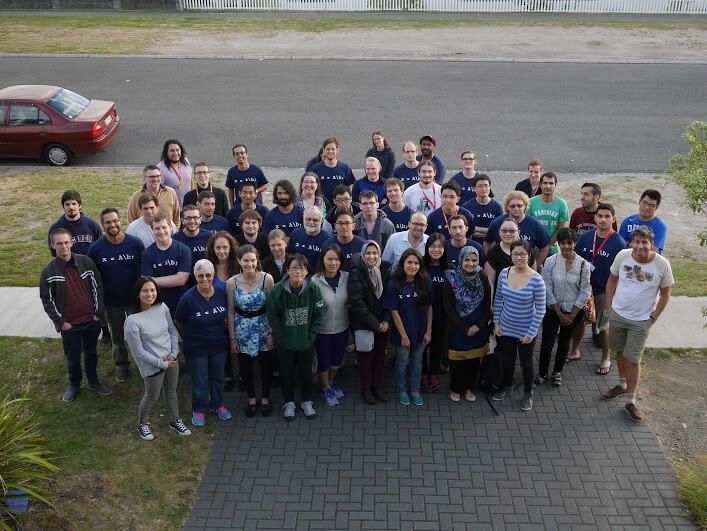

Matt Visser to speak at Te Papa for International Year of Astronomy
08 May 2009 - 17:27 in Event
As part of the IYA (International Year of Astronomy) Matt will give a talk on "Dark matter, dark energy, and the accelerating universe" at Te Papa, Soundings Theatre on Sunday May 24 at 12 noon. He will then lead a Cafe Scientifique style session in the coffee bar at te Papa shortly after.
This talk is part of an event which is being run by the Royal Astronomical Society and is part of the Telescope Roadshow which is supported by the Wellington Astronomical Society.
Abstract: What are "dark matter", and "dark energy", and why do most cosmologists believe in them? Are there alternatives? Are the alternatives any better?
Maths Competition
05 May 2014 - 11:05 in Event
Nearly a hundred mathematicians-in-the-making from Wellington high schools were put to the test this week as they competed in a day-long maths competition at Victoria University.
Run jointly by the School of Mathematics, Statistics and Operations Research and the Wellington Mathematics Association, the competition gave students a chance to work on mathematical problems that are quite different from those studied in school.
Dr Dillon Mayhew, a senior lecturer in the School of Mathematics, Statistics and Operations Research, says students often get the impression that mathematics is all about applying rules. “An event like this shows them that mathematics requires creativity and imagination as well as technical ability. One aspect of the competition is to encourage the participants to think about studying mathematics at university.”
In the morning, teams were quizzed with shorter questions, similar to those posed in the International Mathematical Olympiad. The dynamic changed in the afternoon when students were presented with a problem in industrial optimisation.
“The teams were challenged to find the best possible location for a central warehouse, taking into account the location of subsidiary warehouses and the number of goods being transferred between them,” explains Dr Mayhew.
The judging panel was impressed with the efforts of all the teams, but three were singled out—a Wellington College team came first, Tawa College took second, and a team from Onslow College placed third. Competitors were from seven different high schools throughout the Wellington region.
“The competition is the first collaboration between Victoria and the Wellington Mathematics Association, but we intend it to become an annual event.”
To get a feeling for the types of questions posed, try the following: At a party, some people shake hands. Let n be the number of people who shake hands with an odd number of people. Why is n even?
MSOR enters arrangement with SISSA, Trieste
22 Nov 2010 - 19:24 in Event
The School has entered into an agreement with the Scuola Internazionale Superiore Di Studi Avanzati (SISSA) in Trieste, Italy to encourage the exchange of staff, researchers and graduate students. This builds on the collaborative research relationship that Professor Matt Visser has long had with SISSA.
MSOR Lecture on Erupting Rocks and Dusts - at Waikato University
23 Apr 2013 - 09:40 in Event
MSOR Associate Professor Mark McGuinness will deliver one of the 10x10 Lecture Series presentations on "Erupting Rocks and Dusts" at the University of Waikato on 22 May. The 10x10 Lectures are a series of ten speakers at ten locations in ten months, where New Zealand mathematicians talk about their work and how they are helping to find solutions to today’s problems.
More details can be found at http://www.royalsociety.org.nz/events/10-x-10-lecture-series/hamilton-may/
MINZ 2016
09 Mar 2016 - 16:10 in Event
Mathematics in Industry New Zealand 2016
4-8 July 2016, at Victoria University of Welington. Co-Director: Prof Mark McGuinness Please come and join us at Victoria University of Wellington to solve interesting and vital industry challenges to help New Zealand businesses innovate and grow. The meeting is centered around a number of brainstorming problem-solving working groups, applying mathematics, statistics, physics and engineering principles to real problems brought by local businesses and industry. More soon on the actual problems for this year. Free registration. To express interest, contact admin@minz.org.nz For more information please click on this link MINZ 2016, or look at the website http://www.minz.org.nz There are some fascinating comments about these Study Groups on the YouTube clip https://www.youtube.com/channel/UCBdlFHZ1WA4kiy3WQABUGjAPromising numbers at annual Maths Challenge
17 Apr 2015 - 10:50 in Event
Over a hundred high school students were put to the test this week during a day-long maths competition at Victoria University.
Run jointly by the School of Mathematics, Statistics and Operations Research and the Wellington Mathematics Association, the competition gave students from ten schools around the Wellington region the chance to work on challenging mathematical problems.
“It’s a great, fun event with plenty of prizes and challenges. Students travelled from as far as Paraparaumu to participate”, says organiser and School Liaison Rebecca Burke.
Students were quizzed with short Olympiad-style questions in the morning, followed by a large multifaceted problem in the afternoon.
Wellington College were named winners, ahead of Onslow College and another team from Wellington College who placed second equal.
Impressed with the efforts of all the teams, the judging panel—consisting of academics and postgraduates led by one of the School’s Rutherford Discovery Fellows, Dillon Mayhew—also named Chilton Saint James School as Most Consistent, and Scots College as the best Team Player.
The event, first run in 2014, aims to bridge the gap between high school students and University, as well as provide an opportunity to hear from graduate students and learn what Victoria’s maths programmes offer.
Rebecca hopes the event will continue to run annually and grow bigger.
“Despite being held during school holidays we received a great turn out, with bigger numbers than last year. There is a demand for this kind of event and it would be great to reach out to even more College students.”
Hung Le Pham and Dillon Mayhew
27 Sep 2011 - 15:16 in Event
Dr Hung Le Pham and Dr Dillon Mayhew are both keynote speakers at the annual meeting of the Australian Mathematical Society in Wollongong this week, in their respective special sessions.
Forder Lecture 2010
20 Aug 2010 - 15:05 in Event
The Biennial Forder Lecture:
Arithmetic progressions of primes Professor Ben Green -- University of Cambridge. A prime number is one that is divisible by exactly two numbers: itself, and one. The first few prime numbers are 2,3,5,7,11,13,17,19. The apparently random way in which prime numbers occur has fascinated people for centuries, and many attempts have been made to find some type of order in the sequence. One of the most significant recent advances was made in 2004, when Prof. Green and his coauthor, the Fields medalist Terence Tao, proved that the sequence of prime numbers contains arbitrarily long arithmetic sequences. An arithmetic sequence of numbers is one in which each number is obtained by adding some constant to the previous number. For example, 3,7,11 is an arithmetic sequence, since each number is obtained by adding 4 to the previous number. As it happens, every number in this particular arithmetic sequence is a prime. It was a longstanding problem to show that it is possible to find arithmetic sequences of arbitrary length that are made up entirely of primes. Prof. Green will talk about his and Prof. Tao's solution of the problem. The lecture is open to the public and will be appropriate for a non-specialist audience. 6.30pm Monday 13 SeptemberMaclaurin LT102,
Victoria University,
Kelburn Parade Download a poster for this lecture Ben Green's homepage More information on arithmetic sequences in primes For information on the seminar, email Dillon Mayhew
International Biometrics Society Meeting 2009
15 Feb 2010 - 13:52 in Event
Four members of the Statistics and Operations Research Group (Ivy Liu, Richard Arnold, Nokuthaba Sibanda [pictured, catching prawns in the rain], and Shirley Pledger) recently attended the 2009 regional meeting of the International Biometrics Society (IBS), held in Taupo in December.
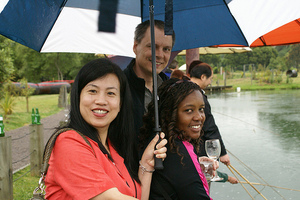
The conference programme covered a wide range of subjects in biostatistics - with Victoria researchers presenting work on Capture-Recapture, Bayesian infrerence in genetics and analysis of multiple response data in contingency tables. The conference particularly attracted researchers from NZ and Australia (some of whom had never seen rain before), as well as others from around the world.

10 x 10 Lecture Series
08 Jul 2013 - 09:40 in Event
The 10x10 series - ten speakers at ten locations in ten months. Come and listen to New Zealand mathematicians talking about their work and how they are helping to find solutions to today’s problems.

